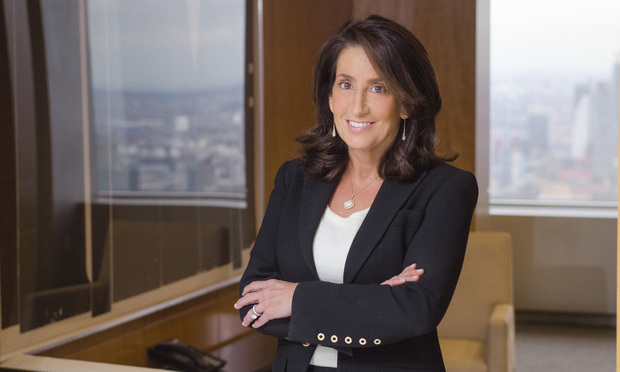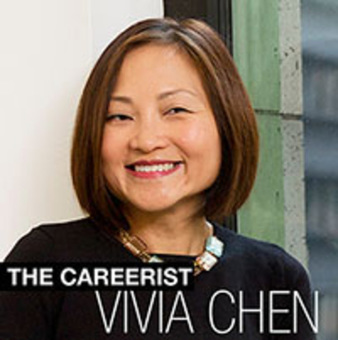Is Sandra Goldstein the Highest Paid Female Partner in Big Law?
Any way you look at it, the Kirkland & Ellis litigation partner is making fat stacks of cash—particularly at a time when women still lag behind men at most firms.
May 29, 2018 at 05:05 PM
6 minute read
 Sandra Goldstein. (Courtesy photo)
Sandra Goldstein. (Courtesy photo)
It's big news when a partner leaves the hallowed halls of Cravath, Swaine & Moore. And even bigger news when the partner is a woman. But when that move comes with reports that she'll be making $11 million annually for the next five years (not counting the sign-up bonus), the news is a showstopper.
That describes Sandra Goldstein, who recently vaulted to Kirkland & Ellis from Cravath. Though it's hard to say if she's officially the highest paid female partner in Big Law, I'm willing to bet she's way up there. (According to The New York Times, which broke the story about her compensation, the amount “is an estimate and not technically a guarantee,” though two people involved in discussions with her confirmed the amount.)
Any way you look at it, Goldstein is making buckets of moolah—particularly at a time when women still lag behind men at most firms.
So who is Goldstein? How did she do it? And what advice does she have for other women?
Below is an edited version of my chat with Goldstein at Kirkland's midtown office in Manhattan.
You grew up at Cravath. You went there right out of NYU Law School in 1987, and you were the youngest associate to make partner (at age 30). Why did you leave it for Kirkland?
Kirkland has energetic, business-minded people and an enormously diverse practice. I was at Cravath for 30 years and I have friends there, but this was a choice to go to firm with an even greater platform.
They strike me as polar opposites—Cravath is traditional and lockstep, while Kirkland has a reputation of being the Wild West where partners eat what they kill. Did you find that a culture shock?
Culture is a big word. it depends on how you break it down. There's an extraordinary culture of collaboration at Kirkland. I've already been introduced to new clients. I'll still be doing securities litigation and commercial litigation. There's greater breadth of practice here, like private equity. It's not changing but expanding my practice.
I have to ask about that fat elephant in the room—that fat compensation package you reportedly are getting at Kirkland. Did you jump ship for the money?
I did not decide to leave Cravath after 30 years for monetary reasons.
Let's talk about how you got where you are. By any measure—for men or women—you've been extremely successful. You must have enormous drive.
I had a spectacular role model in my mom [Gloria Goldstein]. She was a trial lawyer for 22 years with my dad, then became judge of New York Supreme Court, and then elevated to the appellate division. She's in her late 80s, and she is still working at the appellate division as a judicial hearing officer. She failed at retiring.
Interesting you cite your mom. I've talked to a number of women partners who credit having a working mother for their careers.
My mother was committed to her career and her three children. There was never a time in my childhood when I wished she was present. She was always there, and I never wanted for attention. If she was able to do it, I could, too, because she had it much harder. My mother graduated No. 1 from Brooklyn Law School, but it was not acceptable at the time for a woman to be in that position. The school held a private ceremony for her, but it was a male student who gave the graduation speech. When I graduated from NYU [law school], I didn't feel like a pariah the way my mother did.
 There's obviously been progress since your mother's time. Did you ever experience sexism in your own career?
There's obviously been progress since your mother's time. Did you ever experience sexism in your own career?
I didn't experience bias on a global level. I never thought men didn't want me to succeed. But did people underestimate me? Absolutely. And if an opponent underestimated me, I thought that was great because I made sure they paid for it!
You've succeeded phenomenally, but that's not true for women overall. How do you assess the pace of change for women in the last 30 years ?
There are a lot more programs and discussion about making sure that women know that they can succeed. And there's more focus that you can pursue career and family.
The profession is not right for everyone. It is an exceedingly rewarding but hard job that requires time and tenacity.
You have three kids, as did your mother. So what's the lesson to having it all or at least doing it all?
In my mom's mind, everyone has a choice. You do what you want is what she taught us. If you want to be a lawyer in a big firm, you do it. If you want to opt out, you do that. My mom never said, “You will face these challenges.” My parents encouraged me and my brothers the same way and told us we had the wherewithal to do what we wanted.
And did you set a goal early on to be a partner at a major firm?
I thought I'd eventually join Goldstein & Goldstein, my dad and brother's practice! I didn't walk into Cravath and think I'd be partner one day. But I also didn't think I was limited. You shouldn't be so dead-set about what you'll do when you're 25.
You ultimately decided to go for it at Cravath—and got the prize. So what is your ultimate advice for lawyers, particularly women, who want to succeed in this competitive profession?
The three most important qualities for the job are judgment, tenacity and confidence. They have to work in tandem, and that's true for women and men. To the extent that women might have less confidence than men, sometimes they have to say to themselves, “You can do this.” You have to picture yourself at that table, in that courtroom. A lot of things are nerve-wrecking, and you need to psyche yourself up. So if you need to talk to yourself, do it. The more you succeed, the more you will succeed.
Vivia Chen is at [email protected] and on Twitter @lawcareerist.
This content has been archived. It is available through our partners, LexisNexis® and Bloomberg Law.
To view this content, please continue to their sites.
Not a Lexis Subscriber?
Subscribe Now
Not a Bloomberg Law Subscriber?
Subscribe Now
NOT FOR REPRINT
© 2025 ALM Global, LLC, All Rights Reserved. Request academic re-use from www.copyright.com. All other uses, submit a request to [email protected]. For more information visit Asset & Logo Licensing.
You Might Like
View AllTrending Stories
- 1Reviewing Judge Merchan's Unconditional Discharge
- 2With New Civil Jury Selection Rule, Litigants Should Carefully Weigh Waiver Risks
- 3Young Lawyers Become Old(er) Lawyers
- 4Caught In the In Between: A Legal Roadmap for the Sandwich Generation
- 5Top 10 Developments, Lessons, and Reminders of 2024
Who Got The Work
J. Brugh Lower of Gibbons has entered an appearance for industrial equipment supplier Devco Corporation in a pending trademark infringement lawsuit. The suit, accusing the defendant of selling knock-off Graco products, was filed Dec. 18 in New Jersey District Court by Rivkin Radler on behalf of Graco Inc. and Graco Minnesota. The case, assigned to U.S. District Judge Zahid N. Quraishi, is 3:24-cv-11294, Graco Inc. et al v. Devco Corporation.
Who Got The Work
Rebecca Maller-Stein and Kent A. Yalowitz of Arnold & Porter Kaye Scholer have entered their appearances for Hanaco Venture Capital and its executives, Lior Prosor and David Frankel, in a pending securities lawsuit. The action, filed on Dec. 24 in New York Southern District Court by Zell, Aron & Co. on behalf of Goldeneye Advisors, accuses the defendants of negligently and fraudulently managing the plaintiff's $1 million investment. The case, assigned to U.S. District Judge Vernon S. Broderick, is 1:24-cv-09918, Goldeneye Advisors, LLC v. Hanaco Venture Capital, Ltd. et al.
Who Got The Work
Attorneys from A&O Shearman has stepped in as defense counsel for Toronto-Dominion Bank and other defendants in a pending securities class action. The suit, filed Dec. 11 in New York Southern District Court by Bleichmar Fonti & Auld, accuses the defendants of concealing the bank's 'pervasive' deficiencies in regards to its compliance with the Bank Secrecy Act and the quality of its anti-money laundering controls. The case, assigned to U.S. District Judge Arun Subramanian, is 1:24-cv-09445, Gonzalez v. The Toronto-Dominion Bank et al.
Who Got The Work
Crown Castle International, a Pennsylvania company providing shared communications infrastructure, has turned to Luke D. Wolf of Gordon Rees Scully Mansukhani to fend off a pending breach-of-contract lawsuit. The court action, filed Nov. 25 in Michigan Eastern District Court by Hooper Hathaway PC on behalf of The Town Residences LLC, accuses Crown Castle of failing to transfer approximately $30,000 in utility payments from T-Mobile in breach of a roof-top lease and assignment agreement. The case, assigned to U.S. District Judge Susan K. Declercq, is 2:24-cv-13131, The Town Residences LLC v. T-Mobile US, Inc. et al.
Who Got The Work
Wilfred P. Coronato and Daniel M. Schwartz of McCarter & English have stepped in as defense counsel to Electrolux Home Products Inc. in a pending product liability lawsuit. The court action, filed Nov. 26 in New York Eastern District Court by Poulos Lopiccolo PC and Nagel Rice LLP on behalf of David Stern, alleges that the defendant's refrigerators’ drawers and shelving repeatedly break and fall apart within months after purchase. The case, assigned to U.S. District Judge Joan M. Azrack, is 2:24-cv-08204, Stern v. Electrolux Home Products, Inc.
Featured Firms
Law Offices of Gary Martin Hays & Associates, P.C.
(470) 294-1674
Law Offices of Mark E. Salomone
(857) 444-6468
Smith & Hassler
(713) 739-1250













